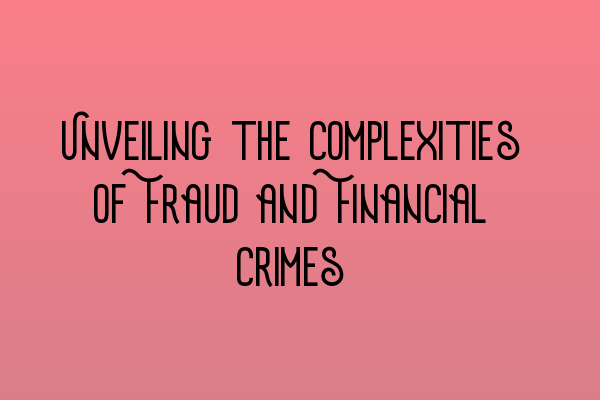Unveiling the Complexities of Fraud and Financial Crimes
Fraud and financial crimes have become increasingly pervasive in today’s society, causing significant harm to individuals, businesses, and the economy at large. The rise of digital technology has given fraudsters new avenues to exploit, thereby necessitating a comprehensive understanding of these complex crimes. In this article, we will delve into the intricacies of fraud and financial crimes, shedding light on their various forms, legal implications, and ways to combat them effectively.
Understanding Fraud and Financial Crimes
Fraud is a broad term encompassing a range of deceptive practices aimed at deceiving individuals or organizations for financial gain. Common forms of fraud include identity theft, credit card fraud, insurance fraud, and investment scams. These crimes can cause substantial financial losses and damage the reputation of victims, leading to long-lasting consequences.
Financial crimes, on the other hand, refer to offenses committed to obtain illicit financial benefits. These crimes often involve money laundering, bribery, embezzlement, and insider trading. Financial criminals employ sophisticated techniques to hide their illicit activities and exploit vulnerabilities within financial systems.
Legal Implications and Consequences
Engaging in fraud and financial crimes can have severe legal implications. In the UK, legislation such as the Fraud Act 2006 and the Proceeds of Crime Act 2002 aim to prosecute and punish individuals involved in fraudulent activities. Perpetrators can face imprisonment, hefty fines, asset forfeiture, and lasting damage to their personal and professional reputation.
It is essential for law firms and solicitors to stay updated with the ever-evolving legal landscape surrounding fraud and financial crimes. Utilizing resources like the SQE 1 Practice Exam Questions and SQE 1 Practice Mocks FLK1 FLK2 can help legal professionals hone their skills and stay proficient in tackling such cases.
Combating Fraud and Financial Crimes
The fight against fraud and financial crimes requires a multi-faceted approach involving proactive prevention, robust detection, and swift legal action. Law firms specializing in criminal law, such as SQE Criminal Law & Practice Law UK, offer specialized SQE 2 Preparation Courses to equip aspiring solicitors with the knowledge and skills needed to effectively combat these crimes.
Additionally, law firms can collaborate with financial institutions, regulatory bodies, and law enforcement agencies to share information, strengthen security measures, and enhance investigatory capabilities. By fostering a collaborative and interdisciplinary approach, the collective effort against fraud and financial crimes can be significantly bolstered.
Conclusion
Fraud and financial crimes pose complex challenges that require a comprehensive understanding and steadfast dedication to combat effectively. By staying updated with legal developments, leveraging relevant resources, and fostering collaboration, the legal community can play a pivotal role in mitigating the impact of these crimes on individuals, businesses, and the economy as a whole. Together, we can aim for a safer and more secure financial landscape.
For more information, explore our SRA SQE Exam Dates to stay informed about upcoming examinations.
